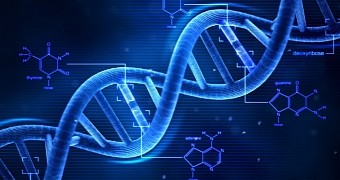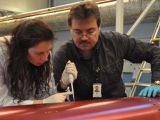Those of you who gave it your best shot to pay attention to what your teacher was talking about in class when you were studying biology probably know that DNA is basically a molecule encoding the genetic instructions organisms need to develop and function.
What's interesting about DNA, whose official name is deoxyribonucleic acid, is that, by the looks of it, it's far more resilient than most people think it to be. In a nutshell, it's tough enough to survive a trip to space and back again.
DNA is one seriously tough molecule
Not long ago, researchers with the University of Zurich in Switzerland sent several small, double-stranded DNA molecules into space with the help of a TEXUS-49 rocket that launched from the Esrange Space Center in Kiruna, North Sweden.
More precisely, they used pipettes to apply the DNA molecules to the outer shell of the rocket's payload section. They then had this rocket complete a spaceflight, and after the spacecraft made it back to Earth, checked to see what was left of the molecules.
Much to their surprise, they found that the DNA applied on the outer shell of the rocket's payload section successfully survived the harsh conditions resulting from the launch, the space flight, and the re-entry into our planet's atmosphere.
Besides, the scientists say that, when recovered and analyzed, the DNA molecules used in this experiment were still very much capable to still transfer genetic information, be it to bacterial or to connective tissue cells.
“This study provides experimental evidence that the DNA’s genetic information is essentially capable of surviving the extreme conditions of space and the re-entry into Earth’s dense atmosphere,” said Professor Oliver Ullrich in a recent interview with the press.
The importance of this study
The University of Zurich scientists behind this research project explain that, first off, their experiment proves that it is possible for DNA of extraterrestrial origin to reach our planet either carried by meteorites or via cosmic dust.
Furthermore, the researchers explain that, if DNA can successfully survive space flights, this means that us humans can contaminate other planets when busy exploring them.
This DNA carried to other worlds all the way from Earth can be mistaken for proof of alien life. Hence, it's important that spacecraft be closely inspected before being sent on one mission or another.
As Professor Oliver Ulrich put it, “The results show that it is by no means unlikely that, despite all the safety precautions, space ships could also carry terrestrial DNA to their landing site. We need to have this under control in the search for extraterrestrial life.”

 14 DAY TRIAL //
14 DAY TRIAL // 



